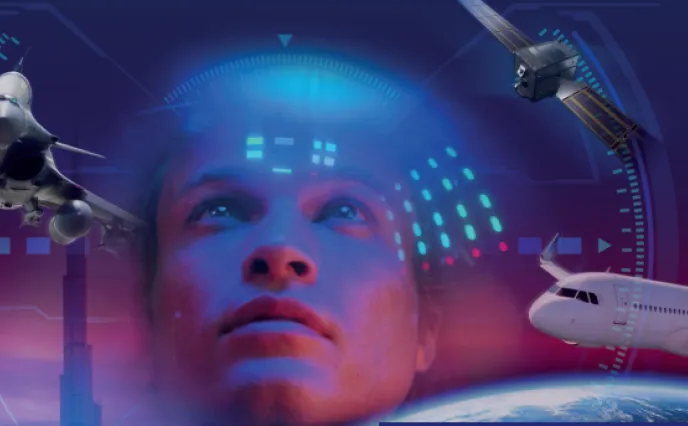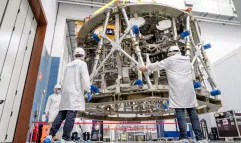From November 17 to 21, meet our experts on the Thales and Thales Alenia Space stands at the Dubai Airshow as we showcase the full breadth of our technologies — enabling national space sovereignty, closing the digital divide with connectivity for all, advancing Earth observation, delivering precise positioning and navigation solutions, and pushing the frontiers of science and space exploration.
Space to Secure and Defend
New Sovereignty Imperatives in Europe and beyond
With the return of high-intensity conflict, new requirements are emerging for defense, especially in secure telecommunications, Earth observation and satellite navigation. In recent months, many nations in Europe and internationally have turned to European space industry partners for the capabilities they need to safeguard their sovereignty in space — especially in Asia, the Middle East and South America.
Demand for defense telecommunications systems is surging. Nations are seeking robust, resilient solutions — hardened against jamming and cyberattacks — to support their armed forces on operations. Building on our proven expertise in constellations, Thales Alenia Space offers three telecommunications satellite product lines tailored to commercial, defense and government needs.
In Earth observation for surveillance applications, Thales Alenia Space delivers state-of-the-art high and very high-resolution optical and radar payloads and constellation solutions combining pinpoint accuracy and high revisit rates, coupled with a multifunction ground segment.
High Revisit Approach for Near Real-Time Surveillance
At Thales Alenia Space, we’ve capitalized on our expertise in optical and radar observation systems and telecom constellations to address new market segments, especially space surveillance and Earth observation at high revisit rates.
For example, our company will supply 13 satellites for Italy’s IRIDE observation constellation, including 12 synthetic aperture radar (SAR) satellites and a high-precision optical satellite.
IRIDE is a pioneering Earth observation program and will use a range of remote sensing instruments and technologies, from microwave radar imaging to optical sensors operating across multiple spatial resolutions and frequency bands. Supported by Italy’s National Recovery and Resilience Plan (PNRR) and led by the European Space Agency in partnership with the Italian Space Agency, the IRIDE program will offer unrivalled prospects for environmental monitoring, resource management and sustainability.

Thales Alenia Space has also launched its advanced All-In-One Earth observation solution, which combines optical and radar microsatellites to guarantee high revisit rates and control capabilities for near real-time surveillance day and night, in all weathers. We secured our first order for this highly innovative solution from Indonesia in 2023. All-In-One is one of the leading surveillance options for nations seeking to safeguard their space sovereignty.

Eagerly Awaited IRIS2 Constellation
The future IRIS2 secure telecoms constellation will be the new standard bearer for Europe’s independent and sovereign space capability. This system will comprise 282 satellites — 264 in low Earth orbit (1,200 km) and 18 in medium Earth orbit (8,000 km) — communicating with each other via optical links in a multiorbit approach.
IRIS2 will provide secure government communication services for civil protection and emergency management agencies, defense and security communications and commercial B2B services.
Beyond connectivity, IRIS2 will be the backbone of other space-based Earth observation and navigation infrastructure in Europe and will serve as a data transmission relay.
This dual-use system will feature disruptive technology, with total control over data and an unprecedented level of security to meet the cybersecurity challenges ahead. Offering native 5G capability, IRIS2 will employ smart payloads with active antennas to ensure precise pointing and maximum signal power over specific regions of interest.
In the first quarter of 2025, Thales Alenia Space was awarded an activation phase contract by the SpaceRISE consortium of telecoms operators (SES, Eutelsat and Hispasat) to enable the initial development and derisking of new high-performance solutions for IRIS² — including the 5G system, a regenerative payload, active antennas and an onboard digital processor.
More recently, our company has been selected for the initial phase contract to design the IRIS² system and secure payload solutions.
With three constellations to our credit and new technologies already in the pipeline, Thales Alenia Space is ready to devote the full range of its expertise to this program, which is vital to Europe’s sovereignty and independence in space.
Stratobus: Midway Between Satellite and Drone
Also making the trip to the Dubai Airshow is Stratobus — an airship packed with innovations. This autonomous, multimission stratospheric platform is the perfect complement to satellite systems and the missing link between drones and satellites. Designed for regional operations, Stratobus flies at an altitude of 20 kilometers, above jet streams and air traffic. It’s aimed at civil and military communications, navigation and observation applications.
Stratobus is a technological gamechanger and doesn’t require a launcher. It will serve armed forces and civil protection agencies, offering a continuous presence across regional coverage areas. As the ideal companion to the Copernicus space-based monitoring program, Stratobus will also support environmental surveillance applications, notably pollution monitoring and wildfire detection.

Space to Connect
Three Tailored Product Lines for Operators
Thales Alenia Space offers multiple mission-configurable product lines to meet the evolving demands of the telecommunications market. From satellites built on the Spacebus B2 platform, well suited to regional operators, to the Spacebus NEO family, the foundation of very high throughput satellites (VHTS) for enhanced connectivity around the world, and Space Inspire, the latest full-digital and reconfigurable in-orbit product line, our company delivers tailored connectivity and mobility solutions to help operators bridge the digital divide and improve global communications. These three product lines cover civil, military and dual-use applications.
Thales Alenia Space is also the first company in the world to offer fully digital processing for terabit-class payloads. And we’re the only satellite manufacturer to propose payloads with powerful fifth generation — and soon sixth generation — digital processors.
This year, our company has won three telecom contracts based on the Spacebus 4000B2. The most recent is a government communications satellite for GovSat, a 50-50 public-private joint venture between the Luxembourg Government and SES. It follows the award of two commercial contracts: THOR 8 for Space Norway and JSAT-32 for Japan’s SKY Perfect JSAT.
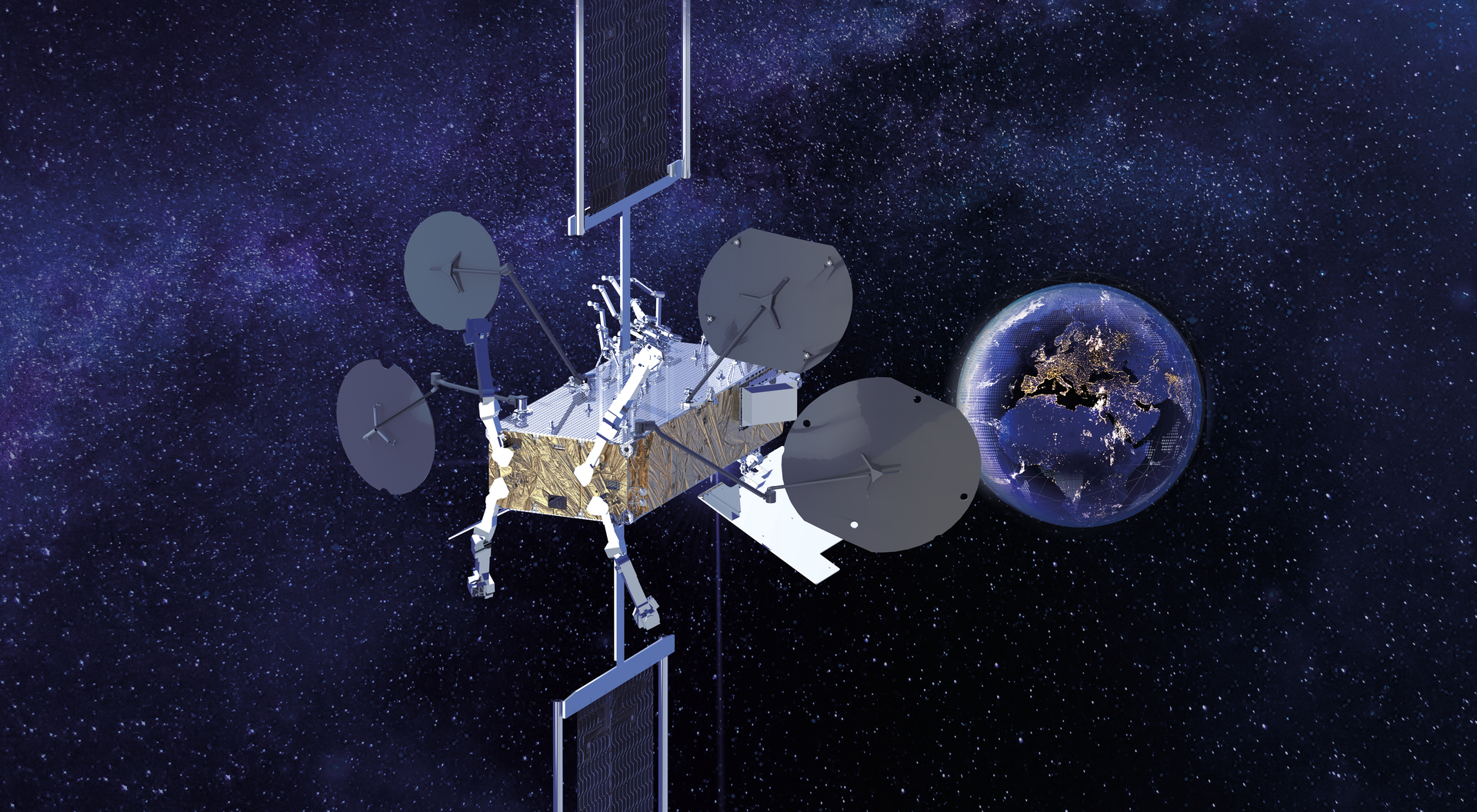
Constellations and Multi-Orbit Approach
With three constellations already to our credit, Thales Alenia Space is among the world leaders in operational constellations, serving requirements in both medium and low Earth orbit.
Telecom satellites are crucial for connectivity and sovereignty. Operators appear to be adopting a multiorbit model — combining the advantages of GEO, MEO and LEO — and the multiuse concept is becoming a fixture of constellation strategies. The flexibility to reconfigure satellites in orbit is now a priority for the world’s leading operators. And besides commercial requirements already identified, governments are starting to incorporate these solutions into their plans, as reflected by the European Union’s flagship IRIS2 constellation initiative and ESA’s LEO-PNT (Low Earth Orbit Positioning Navigation and Timing) project to enhance the performance, precision and integrity of the Galileo satellite navigation constellation.
Space to Travel and Navigate
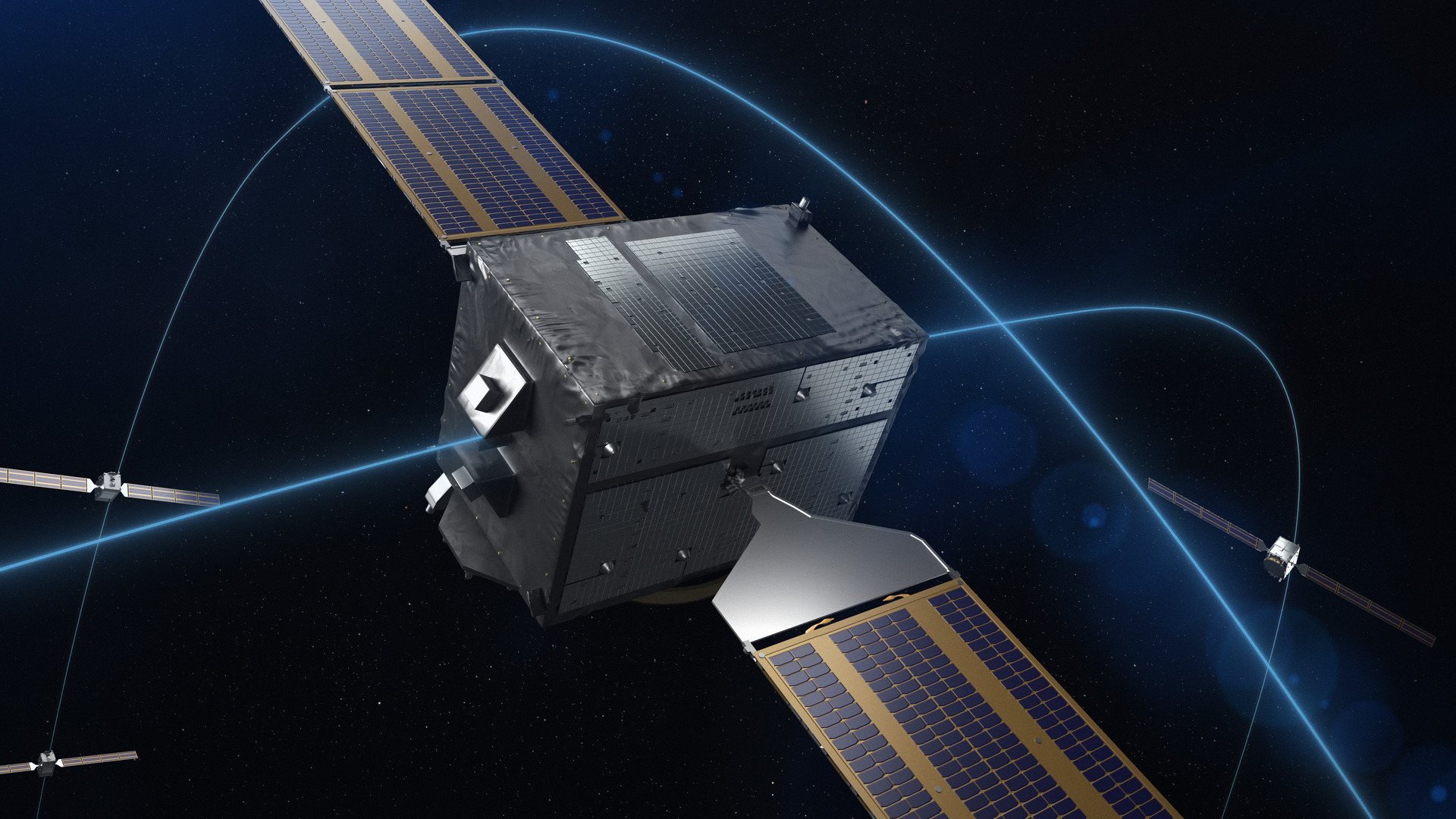
At the forefront of satellite navigation systems in Europe, Thales Alenia Space is prime contractor for the current EGNOS system. We’re also providing the ground segments for two generations of Galileo constellations and building six of the twelve satellites for the Galileo Second Generation constellation.
Our company is also the only manufacturer rolling out satellite-based augmentation systems (SBAS) in export markets, harnessing the technological experience gained through EGNOS, with KASS in South Korea and through our partnership with ASECNA in Africa. In addition, we supplied a system for the Korea Aerospace Research Institute (KARI) to provide safety-of-life services for aviation. This system has been operational since early 2024.
At the same time, we’re deploying several MEOLUT Next ground stations to support search-and-rescue services in a number of nations.
Our teams are also working with ESA on a comprehensive solution for the LEO-PNT orbital demonstrator. This constellation will operate alongside Galileo and other satellite navigation systems to guarantee centimeter geolocation accuracy, robustness, jamming resistance and anti-spoofing, as well as low latency, with ultra-fast acquisition. LEO-PNT will address emerging applications like highly autonomous vehicles (offering continuous coverage in dense urban areas), unmanned aircraft systems (UAS), maritime unmanned systems (MUS) and synchronization of terrestrial 5G/6G telecoms networks.
Geolocation for the Internet of Things
Thales Alenia Space has leveraged its expertise in constellations and navigation systems to address new markets requiring advanced navigation and geolocation capabilities, such as Kineis, the first European constellation dedicated to the Internet of things (IoT).
With Kineis, “notspots” will be a thing of the past, as the system will cover 100% of the globe, including the 85% not currently served by terrestrial networks. The constellation supports near real-time, low-power, low-data-rate transmission for connected devices anywhere in the world. Our company is the system architect and payload supplier for this constellation of 25 nanosatellites — all successfully launched between mid-2024 and early 2025.

Moonlight: A Future Telecoms and Navigation Network Around the Moon
For the Moon to become an effective forward base for space exploration, it must first have a reliable and secure navigation and communication infrastructure. This is the goal of the Moonlight program led by ESA. And Thales Alenia Space is contributing to this program by developing the space segment of the satellite navigation system. This lunar network will enable real-time communication between Earth and human or robotic missions on the lunar surface and continuous connectivity and precise navigation for rovers and astronauts.
Space to Explore
Thales Alenia Space’s expertise in space exploration, space transportation systems and orbital infrastructure is world renowned. For instance, our technologies are flying on iconic international missions exploring the Solar System. Did you know that the Huygens probe, which made history 20 years ago by landing on one of Saturn’s moons, was built by our company?
Today, we’re well placed to meet the future requirements of lunar and Martian exploration, working with space agencies and our partners in Europe, the United States and around the world.
Unrivaled Technological Track Record and World Leadership in Pressurized Modules
Did you know that Thales Alenia Space built half of the pressurized volume of the International Space Station (ISS), including its emblematic Cupola observation module, which offers a 360° view of Earth, and the structure of the Columbus laboratory? We also supplied all the pressurized cargo modules for the Cygnus spacecraft. Twice a year, these resupply vehicles ferry food, water, spares, oxygen and science experiments to the crew on the ISS.
Our teams are also working on the first three modules of Axiom Space’s future commercial space station.
Gateway in Focus
Gateway will be the first international space station to orbit the Moon. It will serve as a forward base for preparing crewed deep-space exploration missions. Positioned far from Earth’s gravity and magnetic field, much of the station’s orbital infrastructure will be dedicated to scientific research. Although smaller than the International Space Station — about 20 meters long vs. 50 meters for the ISS — astronauts will be able to live and work there for up to three months at a time.
For most of its mission, Gateway will orbit the Moon without a crew, roughly 1,000 times further from Earth than the International Space Station. To meet those demands, Gateway is designed for autonomous operations, including robotic maintenance capabilities.
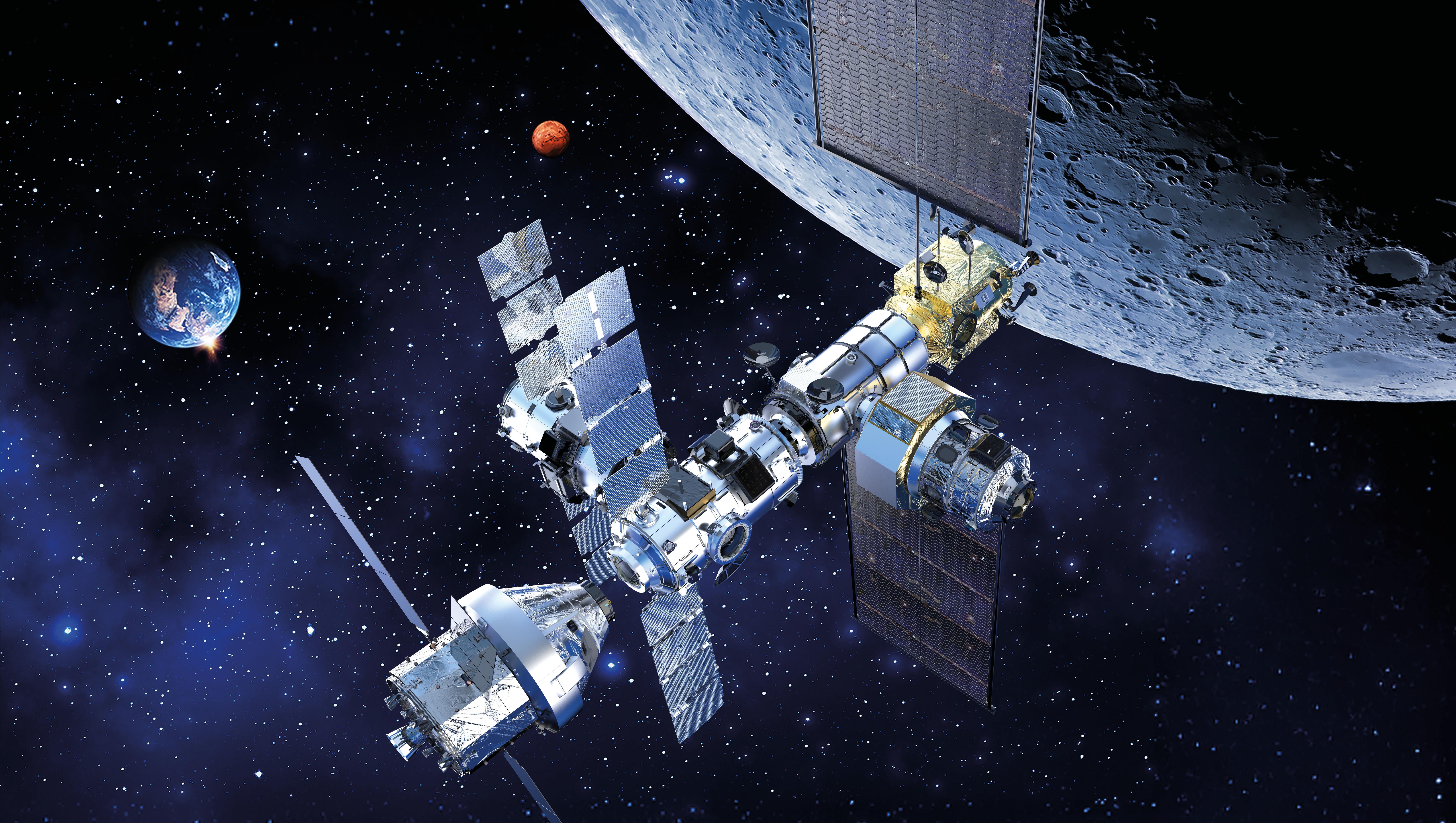
A Central Player in Lunar Exploration
A world leader in pressurized modules, Thales Alenia Space is proud to support the return of astronauts to the Moon and will be a key player at the heart of several lunar exploration programs — including Artemis, with:
- In orbit: Thales Alenia Space is involved across all modules of the future cislunar Gateway — five modules, four of them pressurized. Our teams will also support the Mohammed Bin Rashid Space Centre (MBRSC) in developing the Emirates Airlock Module, which will allow astronauts to perform spacewalks.
- On the lunar surface: Our company will supply the Italian Space Agency (ASI) with the Multi Purpose Habitat (MPH), the first permanent outpost on the Moon’s surface, enabling astronauts to live and work safely in a comfortable environment.
- Cargo transport to the Moon: We’re developing Argonaut, ESA’s lunar descent module, to deliver cargo to the lunar surface.
- Transportation system: Thales Alenia Space is contributing to NASA’s Orion capsule via the European Service Module (ESM).
- Around the Moon: Our company will supply the space-based navigation segment, comprising four satellites, for ESA’s Moonlight program.
Exploring the Solar System
From the Sun to Saturn, Mercury, Venus, Jupiter and Mars, our technologies have been on every space odyssey seeking to unveil the Universe’s most closely guarded secrets and gathering enough data to keep scientists busy for decades. Our company has also embarked on missions to explore asteroids and comets.
These exceptional missions are too numerous to list here. Instead, we’ve decided to spotlight a few major programs, like ExoMars for Mars exploration, EnVision to explore Venus and Euclid studying dark matter and dark energy.
Is There Life on Mars?
One of the highlights of 2024 was the signing of a contract with ESA for the ExoMars 2028 mission. While the Trace Gas Orbiter (TGO) has been circling the Red Planet’s atmosphere for several years now, this second mission will survey its surface in search of traces of life — a quest that’s long fascinated humankind. The mission comprises a transfer module, a descent module and a landing platform carrying the Rosalind Franklin rover. One of its goals will be to detect any living or fossilized bacteria, which could be evidence of past or present life on Mars. Thales Alenia Space is the prime contractor for this program.

Exceptional Science Missions
By examining billions of galaxies over a timescale of more than 10 billion light years — or more than a third of the sky — the Euclid space telescope will lift the veil on the mysteries of the cosmos. Successfully launched in 2023, this science mission is studying dark energy and dark matter to better understand the origin of the Universe’s expansion and the reasons for its acceleration. We built this spacecraft as prime contractor for ESA.
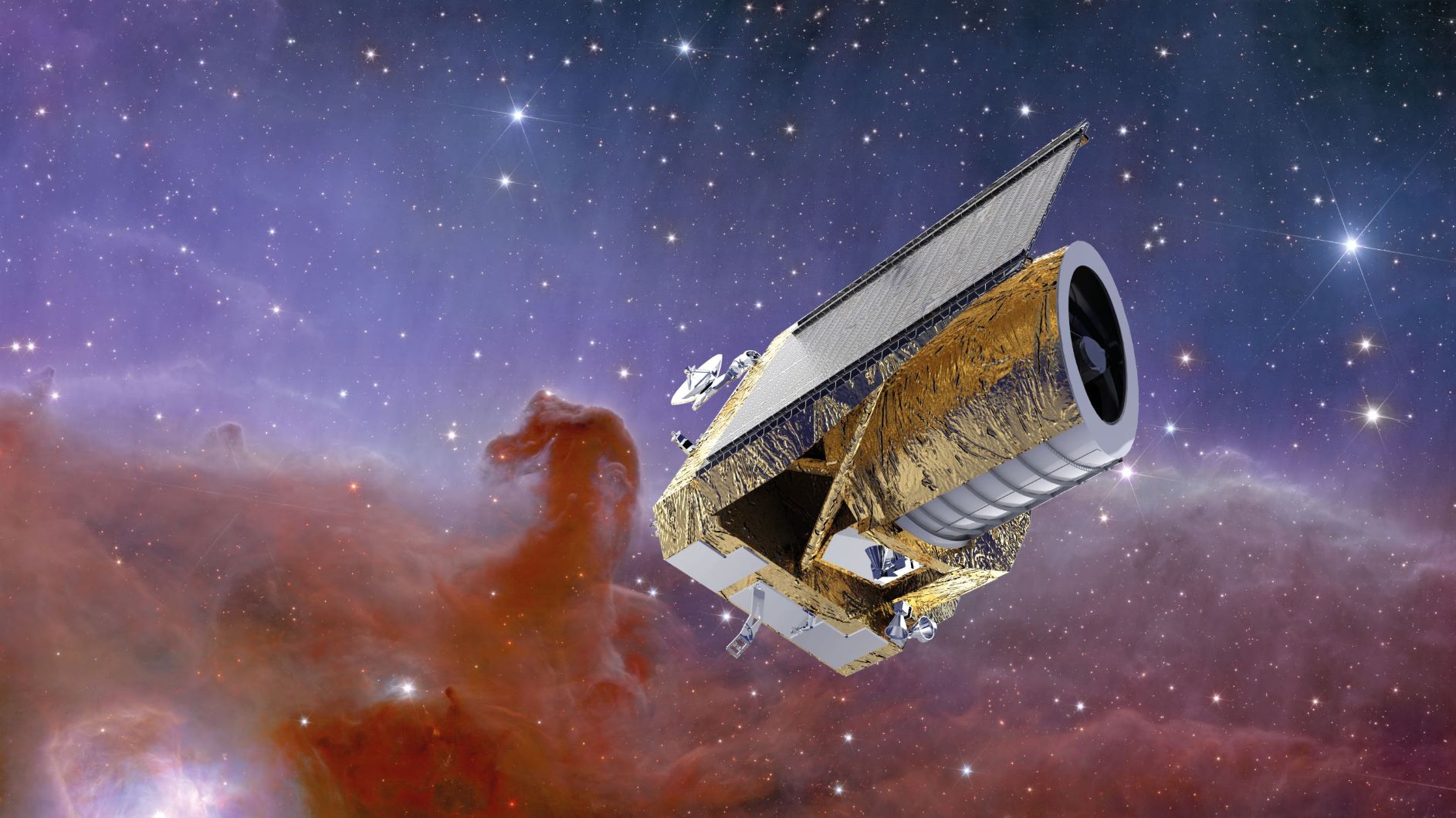
More recently, Thales Alenia Space signed a contract with ESA to build the EnVision orbiter, which will probe the secrets of Venus. This mission will provide a broad picture of the planet, from its core to upper atmosphere, to find out how and why Venus and Earth have taken such different evolutionary paths.

On-orbit Servicing to Extend Satellite Life
Thales Alenia Space is developing a new solution set to attract a lot of attention in the years ahead. On-orbit servicing spacecraft are real “Swiss Army knives” capable of performing a wide range of robotic tasks and rendezvousing in space.
These will include maintenance and repairs, refueling, inspection and deorbiting of space debris. The goal is to extend the operational lifetimes of satellites and thus limit the propagation of space debris — a disruptive approach to foster more sustainable and ecofriendly space operations.
Two Guest Startups on the Thales Alenia Space Stand
We’ll be hosting two startups accelerated by our Space Business Catalyst to explore and co-create new sustainable markets:
- Space Locker (France) will showcase a scale model of its universal interface designed to help democratize and modularize space missions — from hosting diverse payloads to orchestrating shared mission operations.
- Madari Space (United Arab Emirates) will present its concept for space-based datacenters addressing real-world use cases today, such as sovereign data management and space-data processing.
Want to learn more about what we do? Come and meet our experts on the Thales and Thales Alenia Space stands at the Dubai Airshow!

